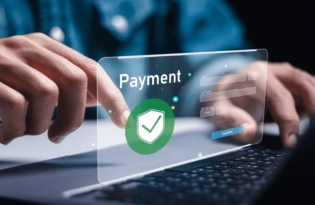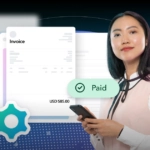Marketplace options in the wake of PSD2
PSD2 regulation is a set of best practices introduced in 2018. The goal is to strengthen innovation and competition in banking aims to help the industry adapt to new tech and services. PSD2 has reshaped the online payments landscape, giving businesses the chance to thrive with new ways to do digital transactions.

Our eBook can help you understand the full scope of marketplace options in the wake of PSD2. It explains:
- How businesses can use APIs to increase payment security and streamline their payment processes.
- The different types of third-party providers, the benefits they offer, and the potential risks associated with using them.
- Regulatory compliance, data protection regulations and consumer rights.
The eBook is also an excellent resource for any business looking to understand the implications of open banking and third-party providers in general.
Understanding PSD2
PSD2 is an improvement of PSD1, which increased transparency in fees and services and bolstered the development of SEPA. It refers to the revised Payment Service Directive, a set of regulations that govern digital payments in the European Union.
The goal of PSD2 is to create an open and competitive banking environment by enabling third-party providers to access customer data from banks or payment service providers. The rights of the consumer are at the forefront of PSD2.
Strong customer authentication
PSD2 widens the regulatory net, applying strong customer authentication (SCA) to digital payments. SCA requires two-factor authentication when processing payments, making it harder for fraudsters to make unauthorized transactions.
Open banking
The introduction of PSD2 allows for access to a more comprehensive range of payment systems, enabling merchants to manage their finances and simplify the overall payment process. Third parties are able to access account information of customers via open APIs.
Transparency and licensing
All entities that process payments and provide electronic payment services must be licensed as payment entities. The PSD2 enforces stricter reporting standards, which enhance transparency.
Security
In terms of electronic payments, two-factor customer authentication must be implemented when processing payments.
According to Payoneer, seller fraud, including account takeovers and chargeback fraud are a growing risk across all marketplaces. It is vital that payment providers offer end-to-end encryption, secure data storage, and fraud protection services.
PSD2 regulation in the marketplace context
Currently, there is limited scope in terms of the “commercial agent exemption”. It is only permitted when the marketplace acts on behalf of the payer or payee (and not both).
This requires the marketplaces to process third party funds per the same standards as banks or other payment service providers.
Weighing marketplace options
When weighing marketplace options, it is important to consider the following:
Getting licensed
Applying for a payment service license won’t change any steps in the money-handling process. However, it can be expensive and time-consuming to obtain a license. It also requires ongoing obligations to maintain the license.
Commercial agent exemption
PSD2 dictates that the marketplace allows a buyer to transfer funds into an account that is controlled by the marketplace. However, this is not the final settlement of the buyer’s debt to the seller. The marketplace must control the transfer of corresponding amounts to the seller.
Third-party providers
Third-parties offer a flexible and cost-effective way to access digital payments, without the need for a license. Strict data protection rules must be adhered to.
Multi-sided platforms
Multi-sided platforms allow businesses to offer a range of services, from payments to credit and lending solutions, all under one roof.
This gives customers access to a range of payment options, as well as liquidity and financial services that would otherwise be unavailable or cost prohibitive.
“Technical Service Provider” (TSP) exemption
A third party licensed payment entity may be used for the collection and transfer funds on behalf of the marketplace. They will act as a Technical Service Provider (“TSP”).
Authorization requests and data will be submitted to the 3rd party for payment processing, but it wil not have ownership or control of the funds.
The concern of the inability to touch funds as they move from buyer to seller can be solved by electing the TSP exemption. This option is low cost, low involvement, and the safest path to compliance.
Considerations when choosing a payment partner
Finding the right payment partner is essential to help marketplaces scale and optimize, and meet the needs of customers and sellers alike. The following values should be considered:
Regulatory compliance
All third-party entities should be properly licensed across the EEA. Specifically, with multi-jurisdictional licensing, a thorough understanding of global regulatory requirements, and strict KYC & AML procedures.
Established marketplace expertise
A reputable payment provider should be well-versed in industry standards and requirements. They should also offer value-add services developed specifically for the modern marketplace and have an extensive marketplace client portfolio.
Creating an open payments world
Leveling the playing field and creating opportunities is at the heart of PSD2. A reliable payment partner must be flexible and able to integrate with multiple PSPs.
Focused on cross-border at the core
Seek out a payment partner with a global footprint, one that is capable of providing customers with a localized payment experience in multiple jurisdictions. They should serve the entire spectrum of its seller base.
About Payoneer
Payoneer is a one-stop solution for businesses accepting payments from customers all around the world. The platform allows you to transact securely with the most cost-effective price options on the market. Get in touch to find the ultimate marketplace payment solution.
Related resources
Latest articles
-
A guide to starting a business in Estonia as a non-citizen
If you’ve thought about opening a new business somewhere with plenty of government support, expanding your business into the EU, or making it easier to work as a contractor or digital nomad anywhere in the European Economic Area (EEA), you should think about starting a business in Estonia…
-
How to simplify payment operations with Payoneer’s automation feature
Save time, reduce costs, and eliminate errors with Payoneer’s new payment automation feature.
-
How to prevent online payment fraud as an SMB
Prevent online payment fraud by overcoming challenges like phishing, fake accounts, and account takeovers (ATO) with enhanced security features from Payoneer.
-
Amazon Fees & Policy Updates 2024
Amazon regularly makes planned updates to fees and policies that may impact Payoneer customers that sell on Amazon. To keep Payoneer customers informed regarding upcoming and past updates, we’re providing a list of known changes to Amazon fees and Policy updates.
-
How Payoneer’s target exchange rate feature will help you save more on bank withdrawals
Boost savings with Payoneer’s target exchange rate feature.
-
Navigating phishing attacks: A guide to keeping your Payoneer account secure
Keeping your funds safe is our number one priority at Payoneer. While phishing attempts can happen, arming yourself with knowledge is key to keeping your data and money safe














